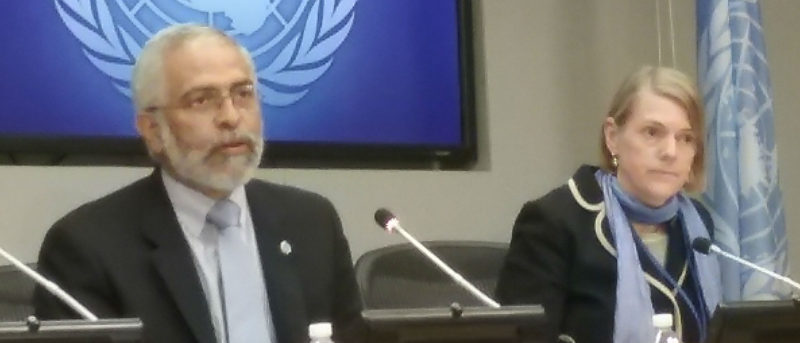
By Arul Louis
United Nations–The UN does not see a serious, long-term impact on India’s economy from the demonetisation, although it will have a short-term effect because of reduced consumer spending, according to an official monitoring the global economy.
“We don’t think it should have a long-term impact,” Dawn Holland, a senior economic affairs officer with the UN Global Economic Monitoring Unit, told reporters here on Tuesday. “We expect the economy to return to the rates of growth we have in our current forecast.”

The UN World Economic Situation and Prospects Report released Tuesday forecasts 7.6 percent growth rate in 2018.
“We don’t expect the country to be in a recession,” Holland said. “That’s not the level of impact we expected. But that will definitely slow the rate of consumer spending in the short term.”
The International Monetary Fund World Economic Outlook Update released here on Monday cut India’s growth rate for the current fiscal year by 1 percent from the earlier projection made last year to 6.6 percentA.
The World Bank has trimmed it’s projection for the current fiscal year by only 0.6 percent to 7 percent.
The UN report, however, had the 2016 growth projection for India at 7.6 for 2016 and 7.7 for 2017.
Holland explained that this was because the report was finalised in early November, just a few days after the announcement of the withdrawal of the Rs 500 and Rs 1,000 notes. “It hasn’t been revised to take into account the impact that might be expected from that,” she said, adding: “We will be looking to revise that down somewhat” when the report is updated in April.
“We do expect is that as we have seen from the first signs that the cash shortages that have resulted in will have significant impact on consumer spending in the short term,” she said, “in the fourth quarter of 2016 and also following into the first quarter of this year.”
Assistant Secretary-General Lenni Montiel said the world economy has not recovered from the period of slow growth of the last few years.
The global economy is expected to grow by just 2.2 percent in 2016 and 2.7 percent in 2017, a slight downward revision from the projections made in May last year.
But he said that South and East Asia “remain the world’s most dynamic regions, benefiting fro from robust domestic demand and supportive macro-economic policies.”
Montiel cautioned that growing inequality could affect the global economy and poverty reduction efforts. Globalisation has been carried out without proper distribution of the benefits, he said. (IANS)





